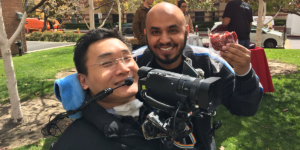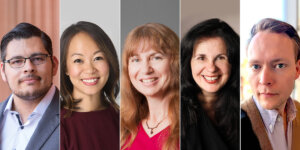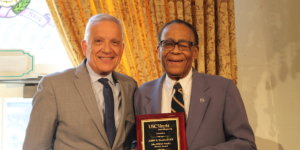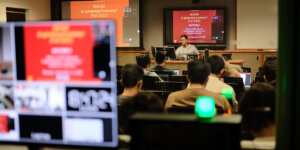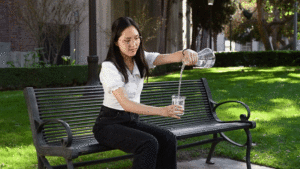
Paul Chiou is honored as a Cal State University Trustee Scholar (PHOTO/Paul Chiou)
Right click on an image in a web-browser and click “Inspect.”
Within the small chunk of HTML code that is highlighted lies an attribute called “alt text,” short for alternative text. Alternative text is typically read aloud by screen readers in place of images, allowing the contents of an image to be accessible to those with visual or certain cognitive disabilities, according to the non-profit organization Web Accessibility In Mind.
The alternative text attribute is among the growing list of web assistive technologies: tools and techniques that people with disabilities use to interact with the web. One of these users is Paul Chiou, a 36-year-old, third-year Ph.D. student in computer science at the USC Viterbi School of Engineering and a person living with quadriplegia.
He dreams of completely revolutionizing the web assistive space by innovating in these technologies.
“My ultimate dream is to create mainstream assistive technologies to offer people with disabilities the opportunity to succeed,” Chiou said. “Because we all can, and we all deserve to.”
Chiou knew in his time as an undergraduate computer science student at California State Polytechnic University Pomona that he wanted to create technologies that help people like himself. Naturally, when he attended the USC doctoral research preview day and watched William Halfond’s presentation, he was captivated. Halfond, a USC Viterbi associate professor of computer science, spoke about quantifying the performance impact of SQL antipatterns on mobile applications. An inspired Chiou immediately applied to the Ph.D. program.
Halfond’s main research area is energy efficiency for mobile devices. In other words, how to elongate their battery life. Under Halfond’s advisement, Chiou focuses on the mobile and web accessibility aspects of this area, working on ways to make seemingly common device operations more accessible to people with disabilities.
“I can’t use my hands to type on a physical keyboard, but I’m fortunate enough to have a piece of assistive technology equipment.”
Chiou navigates device interfaces using his head as a cursor and sip and puff switch controls to select and click.
“If it wasn’t for some innovation in this field, I wouldn’t be here talking to you right now. I can understand the frustration of wanting to do something but not being able to simply because the technology is lacking,” he added.
Most recently, Chiou has worked on projects like designing mechanisms that enable web and mobile user interfaces to be interpreted by Assistive Technologies, thus making them more accessible. As a potential beneficiary of his own research, Chiou is extremely motivated.
Last October, Chiou was selected as an ARCS Scholar, a nationally recognized honor awarded to graduate students in the science, engineering, technology and medical fields with the potential to transform and innovate their field.
“I was never necessarily the brightest student in the room. That, coupled with my injury, have made my educational journey challenging,” Chiou said. “I hope that my story can inspire other students to reach higher no matter their limitations.”
A Fateful Accident
On the night of Oct. 27, 2000, while 15-year-old Chiou’s classmates attended Rowland High School’s homecoming football game, the high school sophomore travelled in the opposite direction on his bike on his way to Friday night church service. In his Rowland Heights neighborhood — a Southern California suburb where he and his grandparents had immigrated from China four years earlier — stood a small church that served as a community hub for many of the neighborhood’s residents. Every week, they came together for companionship and for group prayer and Bible study.
Just as Chiou cycled past his high school’s festivities, he was struck by a car and launched forward over 20 feet. He landed on his neck and fractured his cervical spinal cord, an injury that paralyzed him from the neck down and changed his life forever.
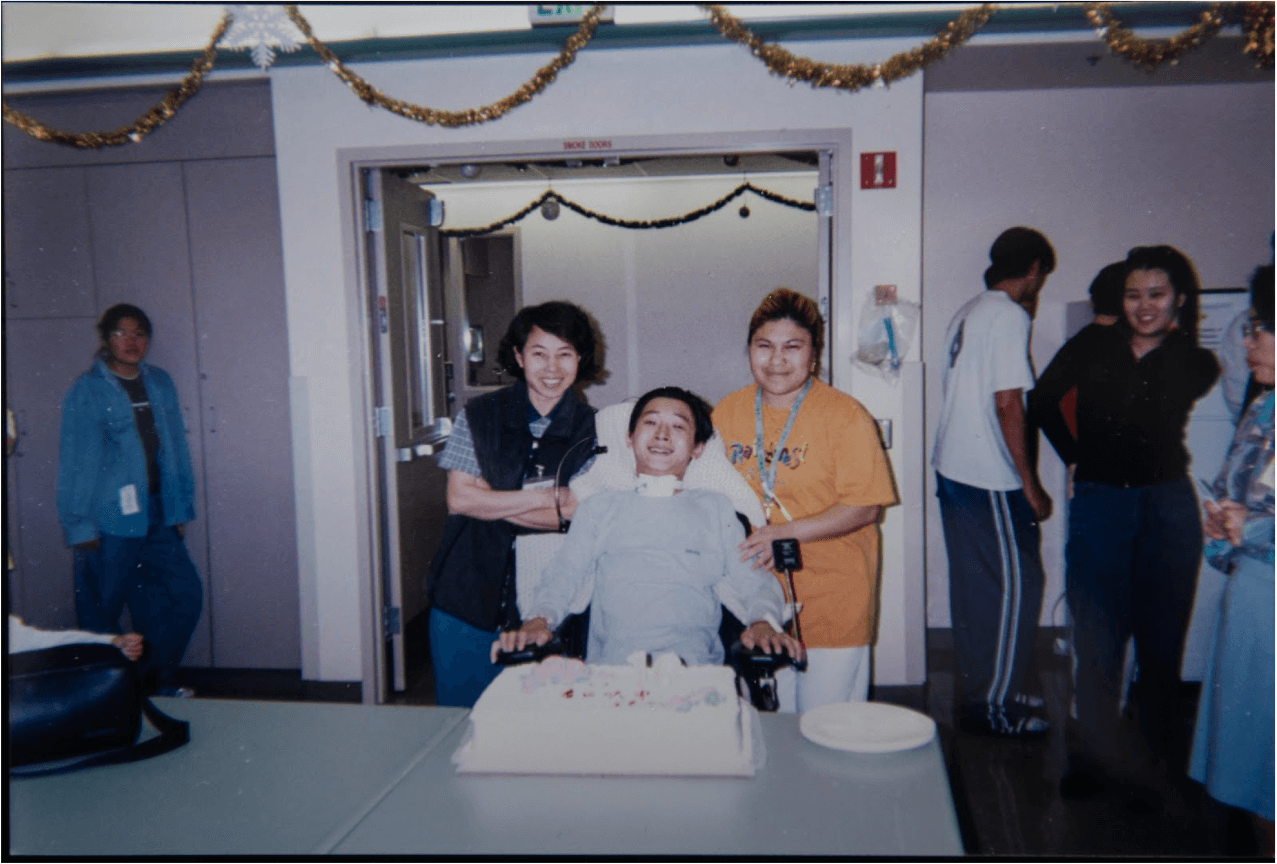
Chiou celebrates his first birthday after his accident at Rancho Los Amigos Rehabilitation Center (PHOTO/Chiou)
Chiou spent the first month after the devastating accident on full life-support at the Los Angeles County+USC Medical Center, and the rest of his sophomore year rehabilitating at Rancho Los Amigos Rehabilitation Center. There, he learned tasks like using a mouth stick to accommodate his physical limitations, operating his wheelchair with his chin, and painting, one of his most impressive hidden talents.
By the time he returned to school, he was so far behind that he risked not graduating. However, Chiou’s time at Rancho Los Amigos prepared him in advance for the challenges he might face as he adapted back to his life after the hospital. With incredible determination, the help of a devoted support system, and, stresses Chiou, “a little bit of sympathy,” he crossed the stage, eager to continue furthering his education.
“If I could change anything about my life, of course I would wish that the accident had never happened — less for my sake and more for the sakes of my grandparents,” Chiou said.
After his parents divorced when Chiou was 2, his paternal grandparents became his guardians. In addition to raising him for most of his adolescent life, they have served as his legal caregivers since his accident. They help him with myriad daily tasks, including helping him sip water and bathe.
“As I get older, I become more aware of the fact that so are they, yet most of their lives are devoted to my care,” Chiou said. “Their sacrifice breaks my heart.”
“On the other hand,” he added, “had it not been for the accident, I would not be anywhere near as outgoing nor accomplished as I am today. I simply would not have had the drive.”
The Journey
Growing up in Chiou’s household meant adhering to his grandmother’s strict no video games policy. Chiou could only access them through the computer, a device too sophisticated for her to monitor. His love for computers and software developed here.
Even more motivating was encouragement by his aunt, Sandia Chiu, who earned a master’s degree in computer science from Tamkang University in Taiwan. Chiou admired her greatly for becoming the first in his family to graduate from college; he strived to do the same.
It was not until he took his first programming class as a sophomore at Mt. San Antonio Community College in 2005 that Chiou knew he wanted computing to be a part of his life forever. Soon after, he switched his major from computer information systems to computer science.
“When I first found out that computers could be used as a tool, I was fascinated,” he said. “I loved using programs like Adobe Photoshop and Microsoft Word, but I never knew that I could create programs to do what I wanted them to do.”
With the same resilience and grit that got him through recovery, Chiou persevered with his education, graduating as a Trustee Emerita Claudia H. Hampton Scholar from CSU in 2017.
Just as indispensable as his drive were the people who believed in him, including one transformational mathematics professor, Tetsuro Kojima at Mt. SAC. It was Kojima, a Ph.D. graduate from USC Viterbi, who encouraged Chiou to apply to his alma mater.
“Paul is an inspiration and a friend to everyone,” Kojima said “Some say he is a genius, but to me, he is simply a cool guy I love to hang out with.”
Though uncertain about what opportunities await him after he finishes his doctorate, Chiou has high hopes of motivating students in the classroom as a college professor, drawing inspiration from the likes of Kojima and the late Professor Bruce Hillam, a quadriplegic and one of the founding members of Cal Poly Pomona’s computer science department.
“I feel so fortunate to have so many incredible role models in my life. I hope that one day, someone can say the same of me,” Chiou said.
Published on March 17th, 2021
Last updated on April 8th, 2021




